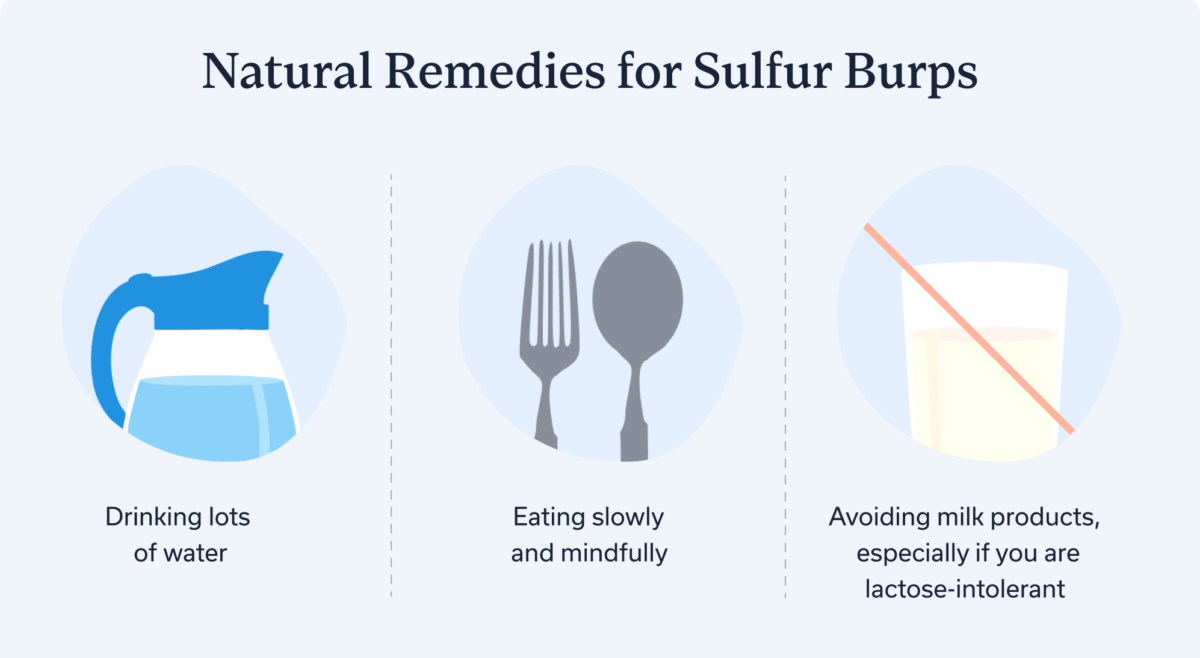Shocking news: Burping is 100 percent normal. It’s a natural way to pass gas and usually isn’t a cause for concern. If, however, your burps smell like rotten eggs, you may wonder if something is awry. Sulfur burps (aka burps with that rotten egg smell) can be uncomfortable, to say the least.
Depending on how often you experience sulfur burps—and if you’re experiencing any other gastrointestinal (GI) symptoms—these burps may be a fluke, or a sign of an underlying condition that needs treatment. Ahead, we’ll discuss what causes sulfur burps, when they are a reason for concern, and how to stop sulfur burps quickly.
What are sulfur burps?
Burps are one of the ways our bodies pass gas. On average, we pass gas 13 to 21 times a day, either through the mouth (i.e. burping or belching) or through the anus (flatulence). Usually, passed gas doesn’t have an odor.
But if a burp smells like eggs, especially rotten eggs, it may be a sulfur burp instead of a “regular” one. This funky smell stems from too much hydrogen sulfide gas in the intestinal tract and may be uncomfortable.
Causes and triggers of sulfur burps
“While occasional sulfur burps are normal, frequent occurrences may indicate an underlying digestive issue that requires attention,” says John La Puma, MD, board certified internist and cofounder of ChefMD. Potential causes can range from the food on your plate to underlying GI conditions to medications, including weight loss drugs like Wegovy.
Diet and sulfur burps
If your sulfur burps are caused by diet, you’ll want to limit your consumption of foods that may increase gas. These foods include, but are not limited to:
- Certain fruits, including apples, peaches, and pears
- Cruciferous vegetables (think: broccoli, cauliflower, kale, and others)
- Legumes, including lentils and beans
- Dairy products like milk and cheese
- Drinks or food that contain high amounts of high-fructose corn syrup
- High-fat foods, like fries or pizza
Sometimes, sulfur burps aren’t caused by the food you eat, but by how fast you consume them. When we eat too fast, we swallow more air, causing more gas to pass. The opposite is true too: Eat slower and you’ll consume less air and pass less gas, sulfuric or otherwise.
Other eating habits that may leading to passing more gas include:
- Chewing gum
- Sucking on hard candy
- Gulping liquids
- Talking while eating or drinking
- Eating large, heavy meals
GI conditions and sulfur burps
Infrequent sulfur burps often stem from eating habits. Recurring burps with a rotten egg smell, on the other hand, may come from something more serious. If you’re experiencing frequent sulfur burps, you should see a GI provider to investigate the possibility of a chronic condition.
Multiple GI conditions have been linked to a higher abundance of hydrogen sulfide in the digestive tract. One condition often tied to sulfur burps is irritable bowel syndrome (IBS). Other conditions that can lead to a higher concentration of hydrogen sulfide in our digestive tract are inflammatory bowel disease (IBD) such as Crohn’s disease (CD) and ulcerative colitis (UC).
H. Pylori infection, an overgrowth of Helicobacter pylori, a type of bacteria found in the digestive tract, have also been known to cause sulfur burps. While both infections cause more burping than usual, additional research is required to confirm those burps are always sulfuric.
Medications and sulfur burps
Sulfur burps are sometimes a side effect of GLP-1 receptors (weight loss medications like Ozempic, Mounjaro, and Wegovy). These medications are approved to treat obesity and/or type 2 diabetes. Among other effects, this drug class increases the time food takes to leave the digestive tract, meaning you feel full for longer.
These drugs may cause unwanted side effects in some people, which may include sulfur burps. Branneisha Cooper, who lives in Dallas, Texas, experienced sulfur burps while taking a GLP-1 medication. “Sulfur burps happen for me when my body is having a hard time digesting certain foods,” says Cooper. “It could be raw veggies, a salad, fried or greasy foods. I used to have [sulfur burps] more often in the beginning of my weight loss journey, but I am well aware of how to prevent them now.”
Other medications and supplements linked to increased gas include:
How the digestive system contributes to sulfur burps
Okay so, passing gas is a normal part of life—and our digestive system. Gas in the digestive tract comes from two places:
- Swallowed air when eating
- The breakdown of undigested foods
In that digestive tract, there are many gut microbiota in our digestive tract. In moderation, hydrogen sulfide provides anti-inflammatory properties to the microbiota, boosts the immune system, and promotes tissue repair.
Symptoms related to sulfur burps
Sulfur burps can be a solo act or appear alongside other symptoms. Accompanying symptoms vary, depending on the underlying cause
Common symptoms you may experience alongside sulfur burps include:
- Abdominal cramps
- Abdominal discomfort
- Bad breath odor
- Constipation
- Diarrhea
- Flatulence
- Heartburn
- Nausea
- Vomiting
Natural remedies for sulfur burps
If you’re wondering how to get rid of sulfur burps instantly, certain fast-acting natural remedies may come in handy. Natural treatments either focus on helping you pass less gas or on reducing the amount of hydrogen sulfide in your digestive tract.
For passing less gas, common remedies include:
- Drinking lots of water
- Eating slowly and mindfully
- Avoiding milk products, especially if you are lactose-intolerant
- Drinking certain herbal teas, such as peppermint and ginger tea
As mentioned earlier, if your sulfur burps occur frequently and they coincide with other GI symptoms, like diarrhea or bloating, there may be a more serious underlying condition at play. Underlying GI conditions (and side effects like sulfur burps) are often exacerbated by FODMAPs, types of carbohydrates that digest poorly in the small intestine.
FODMAPs are a catch-22: For most of us, they are beneficial additions to our gut. But problems can occur when FODMAPs trigger GI symptoms. The low FODMAP diet can help you discover which FODMAPs are personal triggers, when completed under the supervision of a registered dietitian.

Medical treatment for sulfur burps
Depending on what other symptoms are present, a gastroenterologist or GI provider may recommend medication for sulfur burps. The most commonly prescribed medications are antacids, Gas-X, and Pepto-Bismol.
- Pepto-Bismol (bismuth subsalicylate) can be taken for a host of uncomfortable GI symptoms. It reduces inflammation in the intestines and may kill organisms causing harmful side effects. Discuss with your doctor whether Pepto-Bismol is a good option before taking it, even though it is over-the-counter.
- Antacids are another over-the-counter medication used to treat heartburn and GERD. Their many benefits may include reducing sulfur burps, and they can sometimes be used for other GI symptoms as well.
- Gas-X (simethicone) is another option that treats bloating, uncomfortable stomach pressure, and fullness. It’s also over-the-counter and can be taken as a liquid, a chewable tablet, or a pill.
While these medications all work differently, and none are specifically designed to treat sulfur burps, they may help reduce symptoms from underlying conditions that cause sulfur burps.
Whole-person GI care—now available from almost anywhere
Oshi Health is where medical, dietary, and gut-brain treatments come together under one virtual roof, all provided by leading GI specialists. With virtual visits available within 72 hours—including evenings and weekends—we make it easy to see a GI provider within days.
When to seek medical attention
“If sulfur burps persist despite dietary changes, or if they’re accompanied by symptoms like abdominal pain or diarrhea, see your doctor,” says Dr. La Puma.
Alongside abdominal pain and diarrhea, other signs that warrant medical attention include:
- Blood in stool
- Severe dehydration
- Sudden weight gain or loss
- Problems swallowing
- Constipation
- Bloating
When seeking medical attention, a team of GI specialists, like at Oshi Health, may provide the most thorough diagnosis and treatment plan. If you are experiencing extreme symptoms, such as blood in stool or severe dehydration, call 911 or seek emergency medical attention.
Frequently asked questions (FAQs)
-
Sulfur burps can be a symptom of multiple GI conditions, including IBS and IBD. Sometimes, they are caused by a diet high in sulfur or by medications, including GLP-1s.
-
“Eggy burps” are another name for sulfur burps, which means they have multiple triggers as mentioned: eating fast, underlying GI conditions, and/or certain medications like antibiotics and weight loss drugs.
-
Diarrhea and sulfur burps share multiple potential causes. As mentioned above, these include underlying GI conditions, such as IBS or IBD, medications that cause both side effects, or even something you ate.
-
It is safe to eat when you have sulfur burps, though it may be uncomfortable. If you’re experiencing sulfur burps, opt for foods that are less gas-producing and be sure to chew thoroughly.
-
People with diabetes may experience sulfur burps due to prescribed medications, such as GLP-1 receptors like Ozempic. These burps can also be unrelated to diabetes and instead due to the presence of a GI condition.
Final thoughts
- Sulfur burps are uncomfortable, whether they’re a passing symptom or a constant companion.
- When they are the latter, a team of GI specialists can diagnose any underlying conditions, help modify your diet, and connect you with the right treatment options.
- Oshi Health’s GI specialists have helped many patients diagnose underlying GI conditions and find the best treatment plan. If you’re interested in getting to the bottom of what’s causing your sulfur burps and other GI symptoms, contact Oshi Health today.
Oshi is your partner in digestive health
Feel like your digestive concerns are running your life? You’re not alone—and we’re here to help you find lasting relief.
Oshi Health GI providers, gut-brain specialists, and registered dietitians work together to address your symptoms and find solutions that actually work for you.
Whether you’re dealing with chronic digestive issues or unpredictable symptom flare-ups, our GI specialists deliver:
✔ Personalized care plans tailored to your lifestyle
✔ Science-backed strategies to calm your gut
✔ Compassionate, whole-person care
✔ And so much more!
Ready to take control of your gut health?






